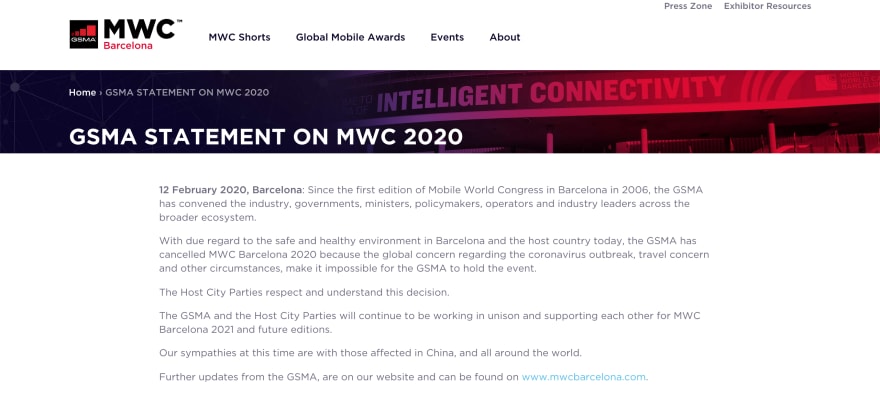As the world faces an uncertain future with the coronavirus 2019 (COVID-19), the tech community is watching as a number of companies change how they produce and participate in conferences.
Major tech conferences such as the Game Developer Conference, RSA, F8, Google I/O and tech companies including Google, Facebook, Sony, AT&T, IBM, and Verizon are assessing the health and safety to their communities who come together in five- and six-digit attendance numbers.
Some sponsors are choosing not to participate, organizers are cancelling and postponing conferences, or "innovating" and going digital. Here are some of the announcements that have been made over the past month.
Mobile World Congress Conference
On February 12th, GSMA cancelled MWC Barcelona 2020 Mobile World Congress Conference (February 24th-27th).
RSA Conference
The RSA Conference (February 24th-28th) continued with their plans, posting updates as the conference approached and IBM, AT&T Cybersecurity, and Verizon made the decision not to participate.
Business Insider mentioned these sponsorships could be worth up to a quarter-million dollars. It isn't clear what happened to these sponsorships.
Verizon, like AT&T, was a gold sponsor of the conference, which dates back to 1991 and is one of the largest events in the industry. The 2020 RSA contract says gold sponsorship costs $160,000. IBM had a platinum sponsorship that the contract says costs $265,000.
PAX East
On February 19th, PAX East (February 27th-March 1st) posted an update that the conference would continue without the presence of Sony.
F8 Developer Conference
On February 27th, Facebook cancelled their F8 Developer Conference (May 5th-6th). Facebook will donate $500,000 to the City of San Jose where the conference was to be held.
Game Developer Conference
On February 28th, it was announced that the Game Developer Conference (March 16th-20th) would be postponed to later this summer.
Cloud Next
On March 2nd, Google announced they would change their upcoming Cloud Next Conference (April 6th-8th) into an all-digital conference.
Google I/O
On March 3rd, Google announced the physical Google I/O (May 12th-14th) was cancelled and tickets would be refunded.
Google said "all guests who have already registered for I/O 2020 will be automatically extended an invitation for I/O 2021."
KubeCon + CloudNativeCon
On March 4th, KubeCon + CloudNativeCon Amsterdam (March 30th-April 2nd) announced it would reschedule for sometime in July or August 2020. KubeCon + CloudNativeCon + Open Source Summit Shanghai in July 2020 has been cancelled.
What happens next?
While it's understandably disappointing for everyone involved that a favorite conference is cancelled, it's important to keep in mind that these conferences are annual events and plan to return next year. More conferences will probably follow suit and either cancel or modify their conferences.
These decisions aren't made quickly. Millions of dollars are involved in producing these conferences, attending them (travel, lodging, and noteworthy after-parties), and sponsorships. There is no doubt money has been lost in cancellation fees and non-refundable reservations -- perhaps the cost of doing business.
But we also don't know what might result bringing tens of thousands of people together into close proximity. An unfortunate outbreak at a conference could devastate the reputation for the companies involved, not to mention the potential impact to the tech community losing trust.
It's also a great time to try out more digital conferences. Attending virtual conferences saves money, allows many more people to attend, and offers new ways of interaction that can continue well past the couple of days that a physical conference would require.
CDC Guidance
The Centers for Disease Control and Prevention (CDC) has posted interim guidance on hosting large events. Here are some of the recommendations, with more details at their website.
- Promote the daily practice of everyday preventive actions.
- Provide COVID-19 prevention supplies at your events.
- Plan for staff absences.
- Promote messages that discourage people who are sick from attending events.
- If possible, identify a space that can be used to isolate staff or participants who become ill at the event.
- Plan ways to limit in-person contact for staff supporting your events.
- Develop flexible refund policies for participants.
- Identify actions to take if you need to postpone or cancel events.
- Update and distribute timely and accurate emergency communication information.
- Identify and address potential language, cultural, and disability barriers associated with communicating COVID-19 information to event staff and participants.
- Distribute health messages about COVID-19 to event staff and participants.
- Put into action strategies for postponing or canceling your events.
What conferences are you planning to attend and how are you responding?













Top comments (1)
I actually cancelled an upcoming workshop in NYC after our company suspended other biz travel. We are looking at options to host remote, reschedule later in the year, and otherwise adjust our plans.